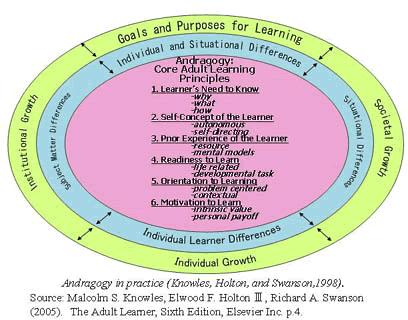Andragogy

Malcolm Knowles first proposed the concept of andragogy in 1968. His theory, reflected above, includes five assumptions regarding adult learners. The adult learner is somehow who
- "has an independent self-concept and who can direct his or her own learning,
- has accumulated a reservoir of life experiences that is a rich resource for learning,
- has learning needs closely related to changing social roles,
- is problem-centered and interested in immediate application of knowledge,
- is motivated to learn by internal rather than external factors" (Merriam, 2001).
Knowles' theory has been criticized by some, who say it is not a theory, but instead a set of practices (Hartree, 1984 cited in Merriam, 2001). Knowles also came to call andragogy a basis for an emerging theory (Knowles, 1989). Another criticism is that the five assumptions are not limited to adult learning, but also play a role in pedagogy (e.g., motivation) (Merriam, 2001). Eventually andragogy came to be associated with the learning situation, not the learner him or herself (Merriam, 2004).
Andragogy, though not recognized as a theory of adult learning by some, is often the way that educators approach adult learning practice (Merriam, 2004). In other words, anyone in adult education cannot ignore andragogy as a foundational theory of the field even if they are critical of its tenets.
Citations
Knowles, M. S. (1989). The making of an adult educator. San Fransciso: Jossey-Bass.
Knowles, M. S., Holton, E. F., & Swanson, R. A. (2005). The adult learner: The definitive classic in adult education and human resource development. Oxford: Butterworth-Heinemann.
Merriam, S. B. (2001). Something old, something new: Adult learning theory for the twenty-first century. New Directions for Adult and Continuing Education, (89), San Francisco: Jossey-Bass.
Merriam, S. B. (2004). The role of cognitive development in Merzirow's transformational learning theory. Adult Education Quarterly, 55, 60-68.
Web Links
http://ausweb.scu.edu.au/aw04/papers/refereed/lund/paper.htm
A great website detailing differences between pedagogy and andragogy.
http://tip.psychology.org/knowles.html
Useful site that includes overviews of many educational psychology theories (http://tip.psychology.org).
http://www-distance.syr.edu/sdilappendixa.html
From Roger Hiemstra's website, a link to an appendix andragogy resources.
Comments (0)
You don't have permission to comment on this page.